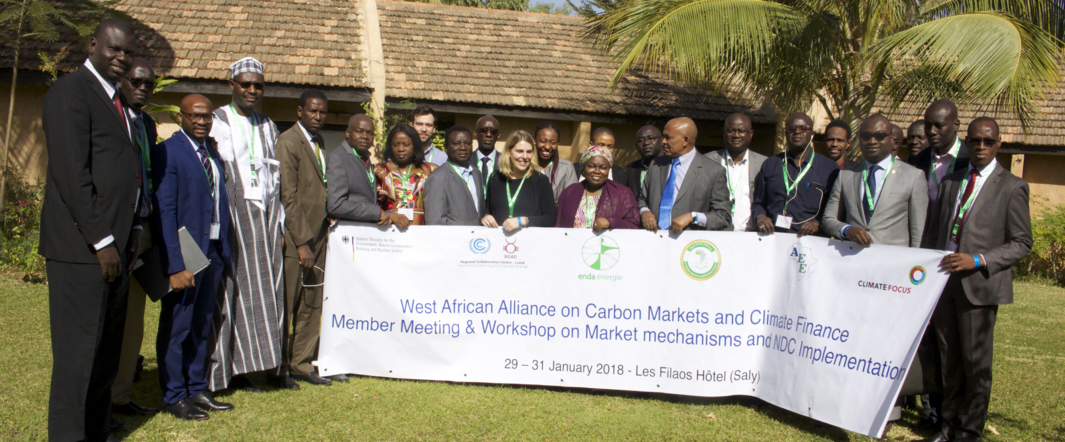
With the adoption of Article 6 of the Paris Agreement, new mechanisms for voluntary international cooperation were established that could bring about significant benefits to the participating Parties. In this context, West African countries have signaled an increased need to actively shape the negotiations on cooperative approaches and the new market mechanism, as well as the handling of existing CDM capacities. The aim is to ensure that they can use these instruments in the future. Against this backdrop, the BMWK-supported West African Alliance for Carbon Markets and Climate Finance aims at strengthening opportunities for West African countries to actively participate in future carbon markets.
The initiative was launched at COP22 in Marrakech (November 2016) and builds on the positive experience of the World Bank's CDM Reform Working Group. By establishing a permanent regional structure with a Secretariat in Dakar, the Alliance aims to enhance the long-term position of West African countries to participate in international carbon markets and improved access to result-based climate finance for NDC implementation. To achieve these goals, the West African Alliance for Carbon Market and Climate Finance relies on the following activities:
● Fostering active participation by West African delegates in the UNFCCC negotiations on market mechanisms, transparency and climate finance
● Promoting access to market mechanisms and climate finance on national and regional level
● Managing the transition of CDM-related capacities and activities into the Paris Agreement context through local pilot projects
● Supporting Article 6 pilot experiences in the region while sharing implementation knowledge in the negotiations and vice versa
The Alliance currently comprises 16 member states: Benin, Burkina Faso, Cape Verde, Ivory Coast, Gambia, Ghana, Guinea, Guinea-Bissau, Liberia, Mali, Mauritania, Niger, Nigeria, Senegal, Sierra Leone and Togo. Following a call for submissions for an in-country readiness support programme in 2018, Nigeria and Togo have been selected as the first two countries to receive tailored readiness support. While Nigeria’s readiness activities focus on its priority sectors and carbon market capacities, Togo aims to strengthen its MRV system capacities.
The West African Alliance Readiness Support Programme to assist the Nigerian Ministry of Environment kicked off in August 2018. more
A scoping mission in July 2018 marked the start of the West African Alliance Article 6 readiness support programme in Togo. more
West African Alliance for Carbon Markets and Climate Finance
Countries: Benin, Burkina Faso, Cape Verde, Ivory Coast, Gambia, Ghana, Guinea, Guinea-Bissau, Liberia, Mali, Mauritania, Niger, Nigeria, Senegal, Sierra Leone, Togo.
Role of BMWK: Co-financed by BMWK
Lifecycle: since 2017
Implementation: West African Development Bank (BOAD)
Other Organisations Involved: UNFCCC-RCC Lomé, ENDA Energie Dakar, Climate Focus
Further Information: www.westafricaclimatealliance.org
Contact: Alliance Secretariat, westafricaclimatealliance@gmail.com
Cookie Settings
Marketing-Cookies werden von Drittanbietern oder Publishern verwendet, um personalisierte Werbung anzuzeigen. Sie tun dies, indem sie Besucher über Websites hinweg verfolgen.
Provider:
Statistik Cookies
Statistik-Cookies dienen der Analyse und helfen uns dabei zu verstehen, wie Besucher mit unserer Website interagieren, indem Informationen anonymisiert gesammelt werden. Auf Basis dieser Informationen können wir unsere Website für Sie weiter verbessern und optimieren.
Provider:
Erforderliche Cookies
Erforderliche Cookies sind für den reibungslosen Betrieb der Website zuständig, indem sie Kernfunktionalitäten ermöglichen, ohne die unsere Website nicht richtig funktioniert. Diese Cookies können nur über Ihre Browser-Einstellungen deaktiviert werden.
Provider: